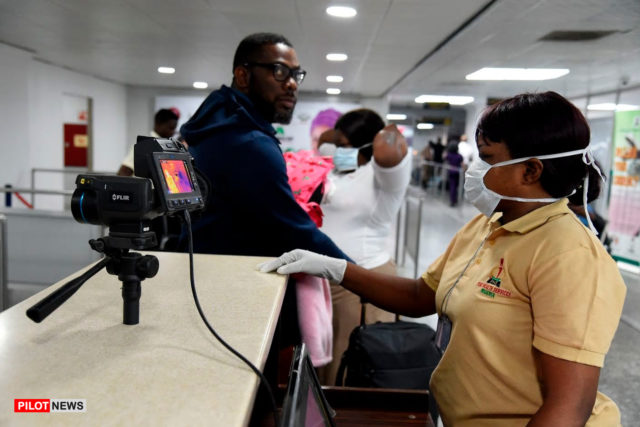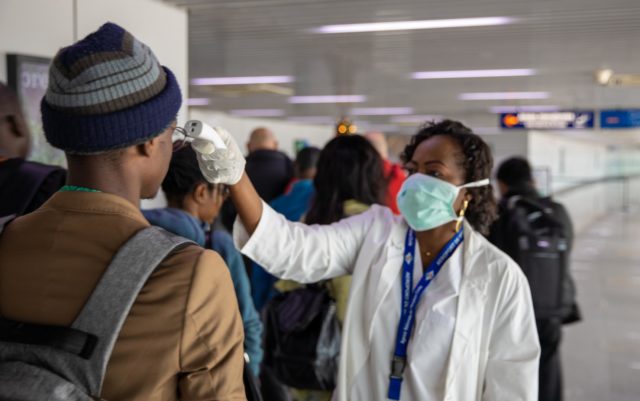Since the beginning of this year, the media was agog with news of the novel coronavirus (Covid-19). The World Health Organization (WHO) China Country Office had on 31st December, 2019 informed the organization of cases of pneumonia of unknown etiology detected in Wuhan City, Hubei Province of China.
By 3rd January, 2020, the Chinese national authorities had reported 44 case-patients with this pneumonia, causal agent unidentified until 12th January when the National Health Commission China announced that the outbreak is associated with exposures in one seafood market in Wuhan City (WHO Situation Report 1).
Within January, three other nations had reported cases of this novel virus (2019-nCoV); Thailand on 13th, Japan on 15th, and the Republic of Korea on the 20th; all these cases were lab-confirmed and imported cases from China. Like a wildfire fueled by globalization, nations are reporting 2019-nCoV of imported cases, and it is gradually crippling the world economy.
Health officials and the government should know that what affects one nation inevitably affects another as imported cases are bound to happen due to the movement of persons from one country to another due to globalization.
As of 20th March 2020, globally confirmed cases are 234073 and 9840 deaths (WHO Situation Report 60); this indeed is alarming and surely requires a high scaled proactive prevention, preparedness and response measures if we hope to see a downward trend.
In Nigeria, the first confirmed case was on 27th February 2020 in Lagos, an Italian citizen who returned from Milan, Italy, to Lagos. The Government of Nigeria then announced the Federal Ministry of Health would implement measures to control any outbreak.

Nigeria’s high population density and peculiarities should have been enough warning signs for authorities to prepare for a pandemic. And to effectively and efficiently respond to the possible outbreak, governments –federal, state, and local level must be proactive, not reactive.
While the general body hygiene of washing of hands, sneezing into one’s elbow, avoiding crowded areas (amongst other measures stipulated by WHO) to be adhered to on the part of the public, the government has a significant role to play in this health battle.
To achieve one of the organization’s strategic objectives of early identification, isolation, and care for patients, including providing optimized care for infected patients, require effective and coordinated government and health professional intervention.
Granted, “Nigeria’s past experiences of quickly responding to the 2014 Ebola outbreak and continuously responding to other infectious diseases such as Lassa fever, have strengthened its health security capacity,” according to Dr. Ifeanyi Nsofor, who is the Director of Policy and Advocacy for Nigeria Health Watch. “Consequently, there are lessons that other countries can learn from Nigeria’s response to Coronavirus,” he concluded.
A cue should be taken from the Chinese government, which, though taken unawares by the virus, rose to the task and built Huoshenshan Hospital in Wuhan, a 1000 bed capacity hospital set up in the shortest period precisely to battle the outbreak.
When Nigeria recorded the first imported case from Italy, given our peculiarities, population, and the constant movement of persons from one state to the other, the federal, 36 state and 774 local governments and all the ministries of health should have prepared for emergencies.
If within a month, Thailand, Japan and Korea recorded incidents of imported cases of the virus from China, what would make any state in Nigeria stand aloof and oblivious that the virus may come knocking someday?
If, despite the 1898 miles between China and Japan, the virus got there in no time, what then can just 282 miles between Lagos and Enugu do to wade it off given the constant movements of persons within the nation?
Imagine the scenario if the suspected case of a 70-year-old woman who came in from the United Kingdom to Owerri, then Enugu tested positive. Luckily, to the relief of anxious citizens, it was negative.
The management of that singular case was a big hoax and shameful. The so-called isolation centre was a nightmare because the medical personnel were untrained. If it had turned positive, no infected patient seeing the pictures of the isolated centre that went viral would have submitted themselves to such treatment.
In my opinion, it should not have been and is just a case of our leaders not being proactive. Yes, maintenance culture in Nigeria at large is zero. A factor that explains the state of the former Enugu isolation centre –considering the issue at stake, containing the virus shouldn’t equate with any cost incurred in rehabilitation. More so, when an index case had manifested in February.
One would expect that identification of an isolation centre and its rehabilitation, if necessary, should have been a priority as a preparative measure against a possible outbreak of the virus. The matter required swift attention given the high risk posed by the virus to human lives. But no, Enugu State waited until the suspected woman, though tested negative, died in the process, and her daughter raised the alarm through the social media how her loved one was treated.
Maybe this prompted the State ministry of health to seek a solution because a couple of days back, the Ministry’s Permanent Secretary, announced the approval of funds by the state government in preparation and prevention of possible outbreak of the dreaded virus in the state. Although a right step in the right direction, it is coming a little bit late than expected. The state’s response was rather reactive than proactive. Thank God, the Enugu isolation centre was relocated to ESUT Teaching Hospital, Parklane.
The Nigeria Center for Disease Control (NCDC), leading the national response, activated the National Emergency Operation Center. All the states of the federation should follow tow the steps and have functional toll free lines accessible to its citizens. Enugu state toll line is 117 and 112, while the dedicated line for emergency response is 08182555550.

The National Rapid Response Team deployed support affected State governments –as stated by NCDC, is the right step. Still, the goal should be to increase the number of laboratories with the capacity to test for COVID-19 in Nigeria for an estimated population of 190 million. Currently, there are only five laboratories in NCDC’s molecular laboratory network equipped with sufficient reagents and supplies for testing.
These laboratories are located in Lagos, Edo, Osun, and the Federal Capital Territory Abuja. This is not evenly spread given that Nigeria has six geographical zones. Only the North Central (Abuja), South West (Lagos and Osun states), and South-South (Edo state) out of the six have such a laboratory located within it. For national emergency health preparedness, the federal government should promptly rectify this anomaly.
- Enugu Govt. Reveals Plan For Generating Plants At NERC Townhall Meeting - April 19, 2024
- Enugu Police Save 2 Men from Angry Mob, Abductee Rescued - April 16, 2024
- Prof Ngwu, 7 Others Confirmed as Chairman and Members Of ENSIEC - April 16, 2024

